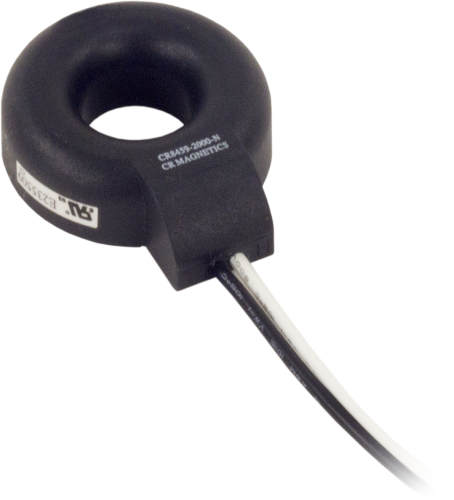This product is not available for new orders.

| Services Available |
|---|
Overview
The CS11 detects and measures the ac current along an electrical wire using the magnetic field that is generated by that current. The sensor outputs a millivolt signal allowing it to be directly connected to our data loggers.
Read MoreBenefits and Features
- Ideal applications include motor or generator load conditions, efficiency studies, intermittent fault detection, and rough submetering
- Sensor is external to the wire jacket and has no direct electrical connection to the system
Images



Detailed Description
The CS11 uses CR Magnetic's CR8459 Current Transformer to detect the ac current along an electrical wire using the magnetic field that is generated by that current. The CS11 is external to the wire jacket and has no direct electrical connection to the system.
The CS11 is recommended for measurements that do not require high accuracy, such as motor or generator load condition monitoring, efficiency studies, intermittent fault detection, and rough submetering.
Specifications
| Measurement Range | 0.15 to 200 A (0.15 to 125 A for CR200X) |
| Frequency | 50 and 60 Hz |
| Insulation Resistance | 100 MΩ (@ 500 Vdc) |
| High Potential | 2000 V |
| Rated Current | 200 A, 125 A (CR200X) |
| Accuracy | Typically ±1% of actual value with provided multiplier (with 10 Ω maximum burden [resistive]) |
| Multiplier | iMult=200 A/1000 mV=0.2 |
| Operating Temperature Range | -25° to +55°C |
| Storage Temperature Range | -25° to +70°C |
| Case Material | Polypropylene resin |
| Construction | Epoxy encapsulated |
| Inner Diameter | 1.9 cm (0.75 in.) |
| Outer Diameter | 4.8 cm (1.89 in.) |
| Height | 1.7 cm (0.67 in.) |
Compatibility
Documents
Brochures
Manuals
Frequently Asked Questions
Number of FAQs related to CS11-L: 5
Expand AllCollapse All
-
Not directly. If the CS11-L is connected to a data logger, the data logger can take the ac measurement and control a solid-state relay based on some threshold within the data logger program. The solid-state relay can then control other relays, solenoids, or motor starters. (Use of a solid-state relay is preferred because the data logger can trigger it with a small 5 Vdc mA signal.)
-
Connect the red wire to ground rather than its normal location on the CR200(X).
-
The following are some of the features of the CS11-L:
- The quality of the measurements was improved by upgrading the 10 ohm internal resistor.
- The CS11-L is compatible with the CR200(X)-series dataloggers, as well as all of the data loggers that were compatible with the CS10-L. This allows the CS11-L to replace both the CS10-L and the CS15-L.
- The programming examples were improved to give greater stability to the measurements. On some data logger models, the ACPower() instruction can be used.
-
Yes. Three CS11-L sensors can be connected to a data logger to measure the amperage on each of three phases.
-
No. The CS11-L is an ac-only sensor.
Case Studies
In 1922, when the intact tomb of Tutankhamen was discovered in Egypt's Valley of the......read more
Articles and Press Releases
Newsletter Articles
Privacy Policy Update
We've updated our privacy policy. Learn More
Cookie Consent
Update your cookie preferences. Update Cookie Preferences
